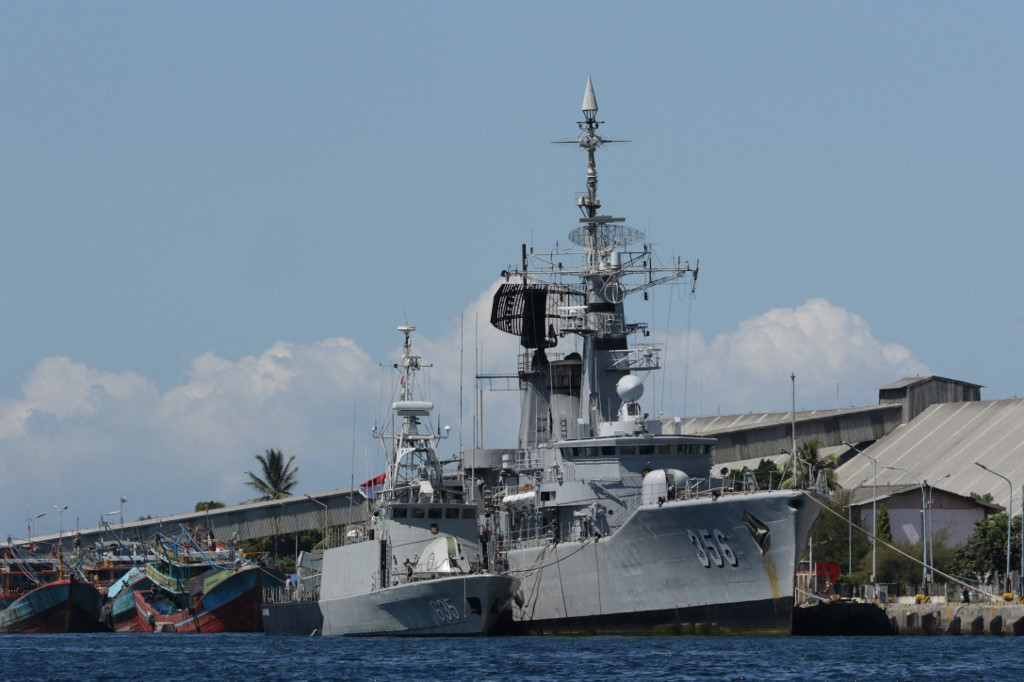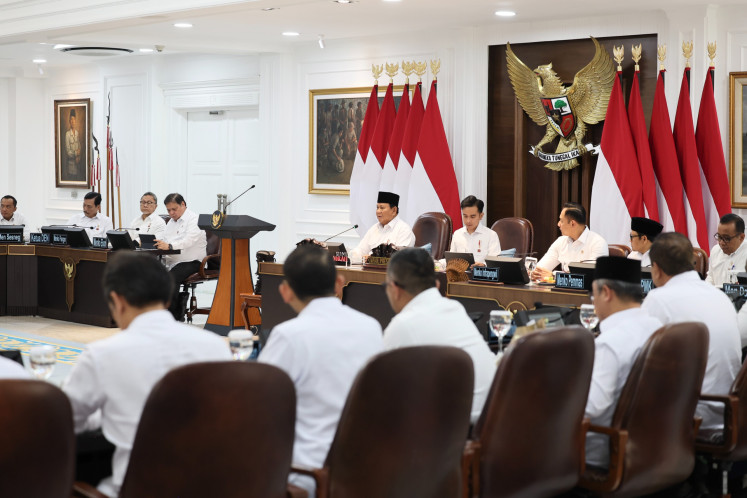Popular Reads
Top Results
Can't find what you're looking for?
View all search resultsPopular Reads
Top Results
Can't find what you're looking for?
View all search resultsIndonesia’s arms procurement and US-China global competition
Indonesia must prepare for some of its neighboring countries having closer affinity with one of the competing powers.
Change text size
Gift Premium Articles
to Anyone
R
ecently, the government sparked controversy with a plan to allocate nearly US$125 billion for defense procurement, including interest payments and maintenance costs. Such an allocation is designed to fulfil defense procurement until 2024.
On the one hand, the proposed figure seems to provide plenty of procurement options. On the other hand, the plan triggered a debate as the government has not yet sketched out the utilization of such a gigantic procurement budget. Others have voiced their concern over the additional financial debt that the government must bear for years to come.
Despite the debate and the realization of the arms-purchasing plan, procurement strategy should not be fixated only on the domestic realm. The international setting is another factor that in reality heavily influences defense policy, including defense acquisition.
The renewed United States-China global competition must surely affect Indonesia’s procurement plans. The US Senate recently passed the Endless Frontier Act, which allocated more than $110 billion to develop new technologies, such as artificial intelligence, semiconductors and biotechnology. Quelling China’s rising competitiveness in the technology race was the key narrative that justified the passing of the act.
Back in March, US Secretary of State Antony Blinken stated that Washington might approach China in a competitive, collaborative or even adversarial manner depending on the situation.
The question then is what the possible impact of this renewed Washington-Beijing rivalry will be on Indonesia’s defense procurement.
We can at least ponder two possible implications that may appear following the renewed strategic competition between the US and China. The first is limited defense procurement sources.
Great powers use arms transfers to expand their global influence, particularly on lesser powers. The Countering America’s Adversaries Through Sanctions Act (CAATSA) shows the implications of great power politics. Under CAATSA, procuring armaments from Russia could potentially put a strain on a country’s relationship with the US.
There is always a possibility for the emergence of the same scenario amid renewed US-China global competition. The emergence of such a polarized situation limits the options for sources of Indonesia’s arms acquisitions. These limitations not only relate to the platforms, but also to other elements of the armaments, such as spares and ammunition.
Furthermore, global competition between great powers might affect military alignment, particularly in terms of exercises and technology adaptation. Acquiring sophisticated armaments alone is insufficient to improve the combat capability of a military. Military exercises with one or more external counterparts can serve as a venue for adopting a new way of warfare or improving military effectiveness.
Nonetheless, tension between the US and China will limit, if not annul, the options for conducting military exercises with overseas participants. Having closer military cooperation with one could invite alienation from the opposite side.
Joint military exercises represent an opportunity for a greater power to enforce its presence and influence. The presence of a large military fleet in a particular region signals the intention of regional engagement. Thus, this may disrupt regional stability, or worse intensify the strategic competition.
Based on the discussion above, we can see that there is a compelling reason for Indonesia to adjust its defense procurement vis-à-vis geopolitical circumstances. Diversifying defense suppliers can be an option to resolve this issue.
Indonesia is in fact no stranger to implementing a diversified procurement strategy. In the past, the fear of arms embargoes and dependency pushed the Indonesian military, particularly the Air Force, to embrace diversification. Diversification can be utilized to reduce dependency and avoid alienation from competing great powers.
However, it should be noted that diversification comes with risks, such as logistics needs and doubts over platform compatibility and interoperability. Therefore, the government must prepare a contingency plan beforehand, particularly to ensure interoperability and to have a proper maintenance regime.
The same scenario of being forced to choose sides might also apply in forging military alignments. This circumstance could certainly undermine Indonesia’s military readiness due to the country’s diversified defense platforms. Preserving military exercises and contacts with overseas counterparts, especially those countries that have strategic meaning for Indonesia, is crucial in maintaining and upgrading the know-how about specific weapons systems.
Indonesia should also prepare to expand and strengthen its military cooperation network. Having military exercises with alternative operators could be a solution. For example, there are a number of Sukhoi jetfighter operators outside Russia, such as India and Malaysia. Embracing these alternative operators could help Indonesia to avoid being ensnared in great power politics. At the same time, Indonesia might still be able to improve its military readiness by gaining new knowledge from those countries.
Besides the limited procurement sources and military alignment, the re-energized rivalry between Washington and Beijing will affect Indonesia’s surrounding international environment. For one reason or another, Indonesia must prepare for some of its neighboring countries having closer affinity with one of the competing powers. This might open an opportunity for increased great power intervention in Indonesia’s surrounding environment, which consequently leads to regional instability.
Indonesia’s latest defense white paper acknowledges the potential disruptive impacts of great power rivalry on the country’s national security. Therefore, ensuring synergy between defense policy, including procurement strategy, and foreign policy will be more crucial than ever. These two realms surely must go hand-in-hand, not separately.
The renewed US-China strategic competition indicates the importance of geopolitical factors on defense policy. Increasing and ensuring the availability of defense budgets will boost Indonesia’s defense capability. Nonetheless, failure to recognize geopolitical dynamics will mean all those good efforts account for nothing.
***
The writer is a visiting fellow at S. Rajaratnam School of International Studies (RSIS), Nanyang Technological University.










